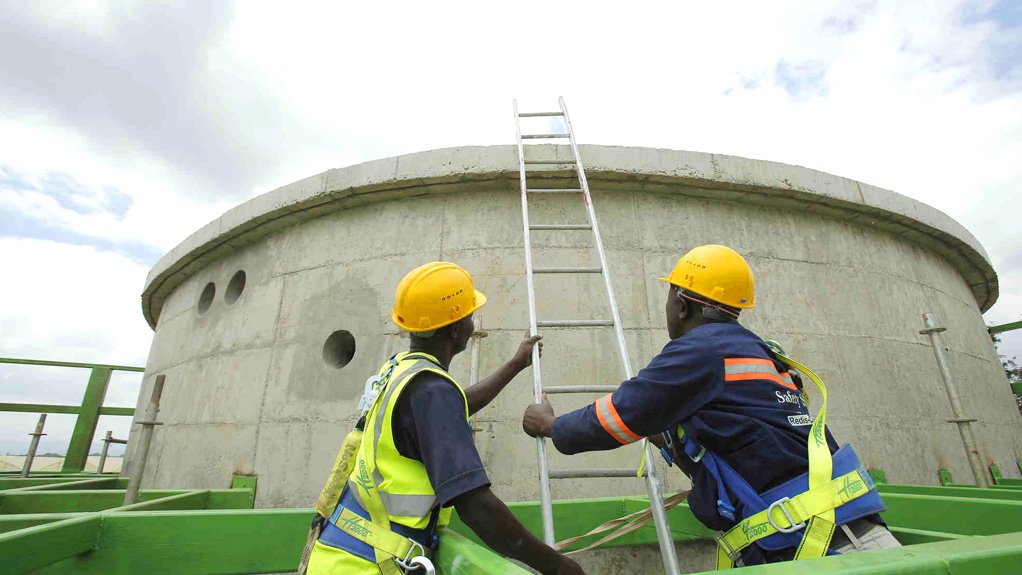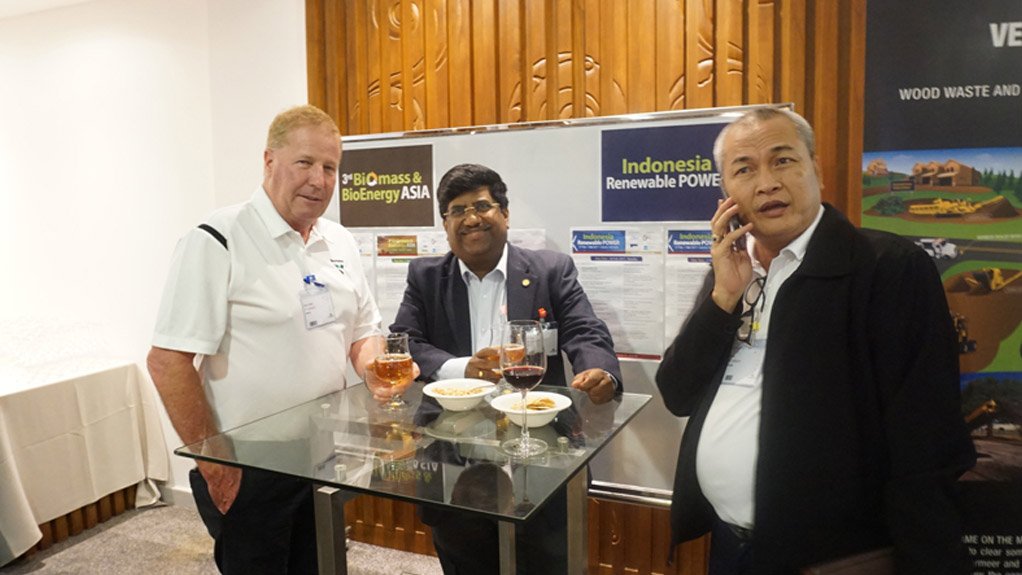African conference strives to boost bioenergy industries



GORGE FARM The commercial vegetable farm in Naivasha, Kenya, hosts a biogas plant as part of a larger renewable energy project - the Gorge Farm Energy Park
FROM ONE CONTINENT TO THE NEXT The Biomass Trade & Bioenergy Africa conference will be in Sandton on September 28 and 29, with the Biomass Trade & Bioenergy Asia having been held in late February
Global conference organiser Centre for Management Technology (CMT) notes that its Biomass Trade & Bioenergy Africa conference will be held at the Radisson Blu Hotel, in Sandton, on September 28 and 29.
CMT hopes that the conference will further the development of the African biomass and bioenergy industries. The conference is a place where stakeholders from the renewable-energy sector – including those from regulatory, project development, technology and financing – can gather to learn from one another, explore opportunities and network.
The organiser says, while solar and wind renewable power have garnered much greater interest – partially owing to the returns and benefits of these energy sources – biomass and bioenergy can enable a balanced and diverse energy approach. In turn, this will provide adequate power output for major cities and industries, and rural electrification at greater affordability and minimal environmental impact.
“Africa has an abundance of agricultural resources that can be [used] efficiently and cost effectively in the bioenergy value chain. “From biomass cofiring, dedicated biopower, biogas and biofuels, Europe, the Americas and Asia have exhibited sustainable case studies which Africa can pick up from,” CMT suggests. It advocates for national mandates and supportive framework such as feed-in tariff schemes to set a foundation for the industries.
Although the bioenergy sector is still at a nascent stage, export opportunities of African biomass, wood chip, wood pellets and palm kernel shells to Europe and North Asia are currently being explored, CMT says.
It adds that, with the growing number of renewable-energy projects in Africa, financiers and investors are relatively cautious and selective when evaluating project bankability, as such projects must be sustainably developed, operated and maintained to offer a solid return.
Conference Offering
“CMT’s Biomass Trade & BioEnergy Africa conference is a not-to-be-missed event for all who are involved in the biomass and bioenergy value chain,” the organiser asserts.
Highlights of the conference include two days of networking and its associated benefits, face-to-face interaction with representatives from regional power utilities, independent power producers, biogas project developers and industrial boilers from the African region.
Attendees will also be able to explore the various bioenergy opportunities in the Southern African region, including gaining insight into biomass power projects in Namibia and Sierra Leone, discover how processing facilities have developed zero waste operations, and learn about updates to the regulatory framework and opportunities on biogas projects in Ghana and South Africa.
Further, CMT notes that the speeches and presentations by a variety of industry stakeholders, including biomass carbonisation technology leaders, biomass export market analysts and power utility and financial institution representatives, will be insightful and engaging.
Signs of Growth
CMT notes that Namibia’s national power utility, Nampower, announced bold plans to construct up to ten biomass power plants (from 10 MW to 100 MW) in May. According to the utility, the bush biomass resources will be locally sourced and supplied to these power plants by commercial farmers.
CMT notes that there have been other regional examples of interest in and implementation of biomass power, biogas and biofuels. A commercial farm in Naivasha, Kenya, hosts a biogas plant as part of a larger renewable-energy project – the Gorge Farm Energy Park. The plant’s anaerobic digester produces biogas, which is used to generate electricity. The electricity is used to power the farm’s operations, with the surplus being sold to the national grid.
According to an article by media company Reuters in February, the plant also generates heat for the farm’s greenhouses, with fertiliser as a by-product. The Gorge Farm is owned by vegetable producer and exporter Vegpro Group. This project was launched in August 2015, with the biogas component – which is a solar/biogas plant – becoming operational in February.
Additionally, financial institution African Development Bank’s (AfDB’s) energy fund, the Sustainable Energy Fund for Africa (Sefa), approved a $993 000 grant to Ugandan renewable-energy company Earth Energy to prepare Uganda’s first-ever biomass gasification project.
The approval was granted in December last year to facilitate the conduct of preliminary studies. These include a complete technical feasibility study, an environmental and social impact assessment, a front-end engineering design and detailed engineering design, as well as project management activities. The plant is expected to add 20 MW of baseload power to the national grid. This support is part of the AfDB’s efforts to scale up private investments in renewable energy.
CMT also points out that State-owned power utility Eskom is looking at developing a biomass project in Mpumalanga. An Eskom representative is scheduled to speak on the utility’s Co-Firing Strategy at the Biomass Trade & BioEnergy Africa conference on September 28.
The organiser agrees with the International Renewable Energy Agency (Irena), which states that bioenergy can be a key employer for developing and developed economies.
Irena’s yearly report on job creation in the global renewable- energy sector, ‘Renewable Energy and Jobs 2017’, noted that liquid biofuels accounted for 1.7-million jobs globally, with solid biomass accounting for 700 000 and biogas 300 000.
CMT hopes its event will covey the benefits of establishing a bioenergy sector, thereby leading to increased implementation of nonconventional renewables to further sustainable growth.
Article Enquiry
Email Article
Save Article
Feedback
To advertise email advertising@creamermedia.co.za or click here
Announcements
What's On
Subscribe to improve your user experience...
Option 1 (equivalent of R125 a month):
Receive a weekly copy of Creamer Media's Engineering News & Mining Weekly magazine
(print copy for those in South Africa and e-magazine for those outside of South Africa)
Receive daily email newsletters
Access to full search results
Access archive of magazine back copies
Access to Projects in Progress
Access to ONE Research Report of your choice in PDF format
Option 2 (equivalent of R375 a month):
All benefits from Option 1
PLUS
Access to Creamer Media's Research Channel Africa for ALL Research Reports, in PDF format, on various industrial and mining sectors
including Electricity; Water; Energy Transition; Hydrogen; Roads, Rail and Ports; Coal; Gold; Platinum; Battery Metals; etc.
Already a subscriber?
Forgotten your password?
Receive weekly copy of Creamer Media's Engineering News & Mining Weekly magazine (print copy for those in South Africa and e-magazine for those outside of South Africa)
➕
Recieve daily email newsletters
➕
Access to full search results
➕
Access archive of magazine back copies
➕
Access to Projects in Progress
➕
Access to ONE Research Report of your choice in PDF format
RESEARCH CHANNEL AFRICA
R4500 (equivalent of R375 a month)
SUBSCRIBEAll benefits from Option 1
➕
Access to Creamer Media's Research Channel Africa for ALL Research Reports on various industrial and mining sectors, in PDF format, including on:
Electricity
➕
Water
➕
Energy Transition
➕
Hydrogen
➕
Roads, Rail and Ports
➕
Coal
➕
Gold
➕
Platinum
➕
Battery Metals
➕
etc.
Receive all benefits from Option 1 or Option 2 delivered to numerous people at your company
➕
Multiple User names and Passwords for simultaneous log-ins
➕
Intranet integration access to all in your organisation




















